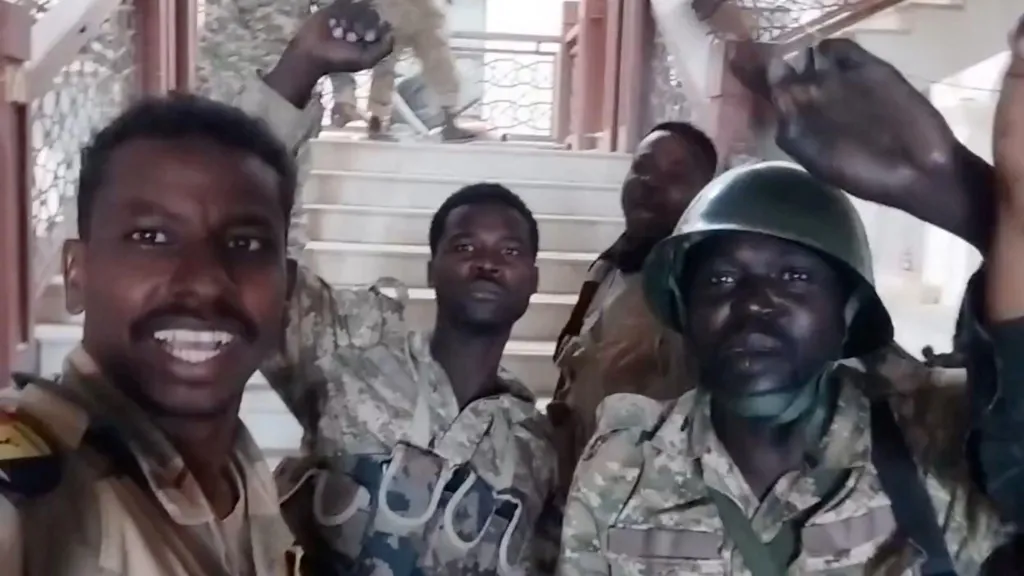The recent scenes of jubilant Sudanese Armed Forces (SAF) soldiers celebrating in Khartoum mark a significant milestone in an ongoing offensive that has seen the army reclaim vast territories in recent months.
After two years of intense fighting to regain control of Sudan’s capital, Khartoum, from the paramilitary Rapid Support Forces (RSF), the SAF has finally succeeded in recapturing the Presidential Palace. However, while this victory is both symbolic and strategic, it is far from a definitive turning point in the bloody civil war that has ravaged Sudan since April 2023.
A Symbolic and Strategic Win
The Presidential Palace, which includes the historic Republican Palace, holds great symbolic significance as a seat of power and sovereignty. For the military-backed government, led by General Abdel Fattah al-Burhan, reclaiming this landmark helps reinforce their claim to be Sudan’s legitimate rulers, fighting what they describe as a “terrorist militia.”
From a strategic standpoint, retaking the palace is a significant achievement for the SAF. Over the past few months, the army has cleared outer districts of greater Khartoum and has now regained much of the city center. Key sites, including government buildings and areas around the military’s General Headquarters, are once again under army control.
Has the RSF Lost Its Grip on Khartoum?
The RSF, led by General Mohamed Hamdan Dagalo, also known as Hemedti, lost its stronghold over Khartoum as the army pushed its fighters out of critical positions. However, while the RSF may have lost formal control over the capital, its fighters are still scattered across the city center and remain stationed in parts of Khartoum International Airport and other strategic locations to the south of the Presidential Palace.
It remains unclear how far the SAF’s frontline has moved, and intense, bloody fighting is expected to continue as the army seeks to neutralize remaining RSF units. Despite its weakened position, the RSF has shown it can still strike back—recently launching a drone attack on the palace that killed several Sudanese journalists and army officers.
A Potential Turning Point or Entrenched Division?
While recapturing the Presidential Palace could be a pivotal moment for the SAF, experts warn that it may not necessarily change the course of the war.
A decisive victory in Khartoum could allow the army to consolidate its control over central Sudan, where it has reclaimed swathes of territory from the RSF in recent months. It could also provide the momentum needed to challenge Hemedti’s forces in Darfur, particularly in El Fasher, a key city that has been under RSF siege for nearly a year.
However, many analysts fear that the recapture of Khartoum may push Sudan further toward a de-facto partition, with both sides entrenching themselves in their respective zones of influence.
The Danger of Partition and Parallel Governments
The RSF continues to control most of the Darfur region in western Sudan and parts of the south, while the SAF dominates eastern and northern Sudan. Both factions have established their own parallel systems of governance in the territories they control, with the RSF even going so far as to sign a political charter and constitution with allied groups in Nairobi last month.
Hemedti’s forces are sending a clear message that despite their losses on the battlefield, they remain a formidable force with ambitions to take full control of the country.
A Humanitarian Catastrophe for Sudan’s People
Amid this protracted conflict, it is Sudan’s people who continue to bear the brunt of the suffering. The United Nations has described the situation as the world’s worst humanitarian crisis.
➡️ More than 12 million people have been displaced from their homes.
➡️ Millions face acute food shortages, with some areas on the brink of famine.
➡️ Khartoum itself is expected to face famine conditions soon, following widespread looting by RSF fighters and severe restrictions on humanitarian aid.
The situation is further compounded by both sides being accused of obstructing emergency aid, effectively using it as a weapon of war. War crimes allegations have also been leveled against both factions, with critics particularly singling out the RSF for accusations of mass rape, ethnic cleansing, and genocide.
Hopes for Peace Remain Distant
While the SAF may view the recapture of the Presidential Palace as a stepping stone toward a broader military victory, the International Crisis Group recently reported that it is unlikely either faction can achieve a decisive victory that would allow them to govern the entire country.
Despite mounting international pressure to end the war and revive peace talks, efforts to negotiate a ceasefire have so far failed. Both sides remain entrenched in their determination to keep fighting for full control of Sudan.
What Lies Ahead?
For now, the recapture of the Presidential Palace provides the SAF with a boost in morale and a potential advantage in future battles. But unless meaningful steps are taken toward a negotiated settlement, the war will likely drag on, deepening the suffering of millions of Sudanese civilians caught in the crossfire.
As Sudan’s civil war enters its third year, the people of the country continue to endure unimaginable hardship, with little hope that the violence will subside anytime soon.



0 Comments